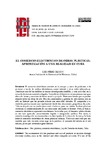Mostrar o rexistro simple do ítem
El comercio electrónico de obras plásticas: aproximación a una realidad en Cuba
| dc.contributor.author | Pérez Orozco, Luis | |
| dc.date.accessioned | 2019-03-26T09:36:57Z | |
| dc.date.available | 2019-03-26T09:36:57Z | |
| dc.date.issued | 2018 | |
| dc.identifier.citation | Anuario da Facultade de Dereito da Universidade da Coruña, 2018, 22: 214-232. ISSN: 1138-039X | es_ES |
| dc.identifier.issn | 1138-039X | |
| dc.identifier.uri | http://hdl.handle.net/2183/22355 | |
| dc.description.abstract | [Resumen] El comercio electrónico consiste en la compra y venta de productos o de servicios a través de medios electrónicos, como Internet y otras redes informáticas. Constituye uno de los ámbitos de mayor investigación científica y más actividad en la creación de marcos normativo-legales. Concede en el domicilio de una persona una gran oferta de bienes y servicios de forma sencilla y rápida. Entre esos bienes que se pueden adquirir están las obras de arte. Hoy día, marchantes y galerías de arte cuentan con un sitio en Internet que les permite enlazar con mercados virtuales. El comprador y el vendedor puedan encontrarse rápidamente desde dos ubicaciones geográficas distantes. Cuba es un país que no queda ajeno a esta dinámica, pues los autores de obras plásticas viabilizan la comercialización de sus creaciones utilizando el Internet. Pero, si bien el comercio electrónico representa muchísimas facilidades para el binomio artista-cliente, su uso trae aparejado inconvenientes legales e inseguridad jurídica. Por tanto, la presente investigación se circunscribe a la descripción de la situación de iure y de facto sobre el comercio electrónico de obras plásticas cubanas. Todo ello motivado por una cuestión que cada vez más cobra auge en la práctica: el aumento del interés en el arte cubano, ya sea por inversión o goce estético. | es_ES |
| dc.description.abstract | [Abstract] The e-commerce it´s the purchase and sale of products or services through electronic medias, such as the Internet and other computer networks. It´s one of the areas of greater scientific research and more activity in the creation within the framework of the law. Grants a great offer of goods and services in a person's home easily and quickly. Among those personal properties that can be acquired are plastic arts. Today, dealers and art galleries have a website that allows them to link with virtual markets. The buyer and seller can be quickly found from two distant geographical locations. Cuba it´s a country that isn´t quite oblivious of this dynamic, because the authors of plastic arts make viable the commercialization of their creations using the Internet. But, while e-commerce represents many facilities for binomial artist-client, it´s use brings with legal problems and insecurity. Therefore, this investigation is limited to the description of the de jure and de facto situation regarding the electronic trade of Cuban plastic arts. All of this motivated by an issue that´s trending upward: the increase of interest in Cuban art, whether by investment or aesthetic enjoyment. | es_ES |
| dc.language.iso | spa | es_ES |
| dc.publisher | Universidade da Coruña, Servizo de Publicacións | es_ES |
| dc.rights | Atribución-CompartirIgual 3.0 España | es_ES |
| dc.rights.uri | http://creativecommons.org/licenses/by-sa/3.0/es/ | * |
| dc.subject | Obra plástica | es_ES |
| dc.subject | Comercio electrónico | es_ES |
| dc.subject | Ley de Derecho de Autor | es_ES |
| dc.subject | Cuba | es_ES |
| dc.subject | Plastic art | es_ES |
| dc.subject | E-commerce | es_ES |
| dc.subject | Copyright Law | es_ES |
| dc.title | El comercio electrónico de obras plásticas: aproximación a una realidad en Cuba | es_ES |
| dc.type | info:eu-repo/semantics/article | es_ES |
| dc.rights.access | info:eu-repo/semantics/openAccess | es_ES |
| UDC.journalTitle | Anuario da Facultade de Dereito da Universidade da Coruña | es_ES |
| UDC.volume | 22 | es_ES |
| UDC.startPage | 214 | es_ES |
| UDC.endPage | 232 | es_ES |
| dc.identifier.doi | https://doi.org/10.17979/afdudc.2018.22.0.5184 |






